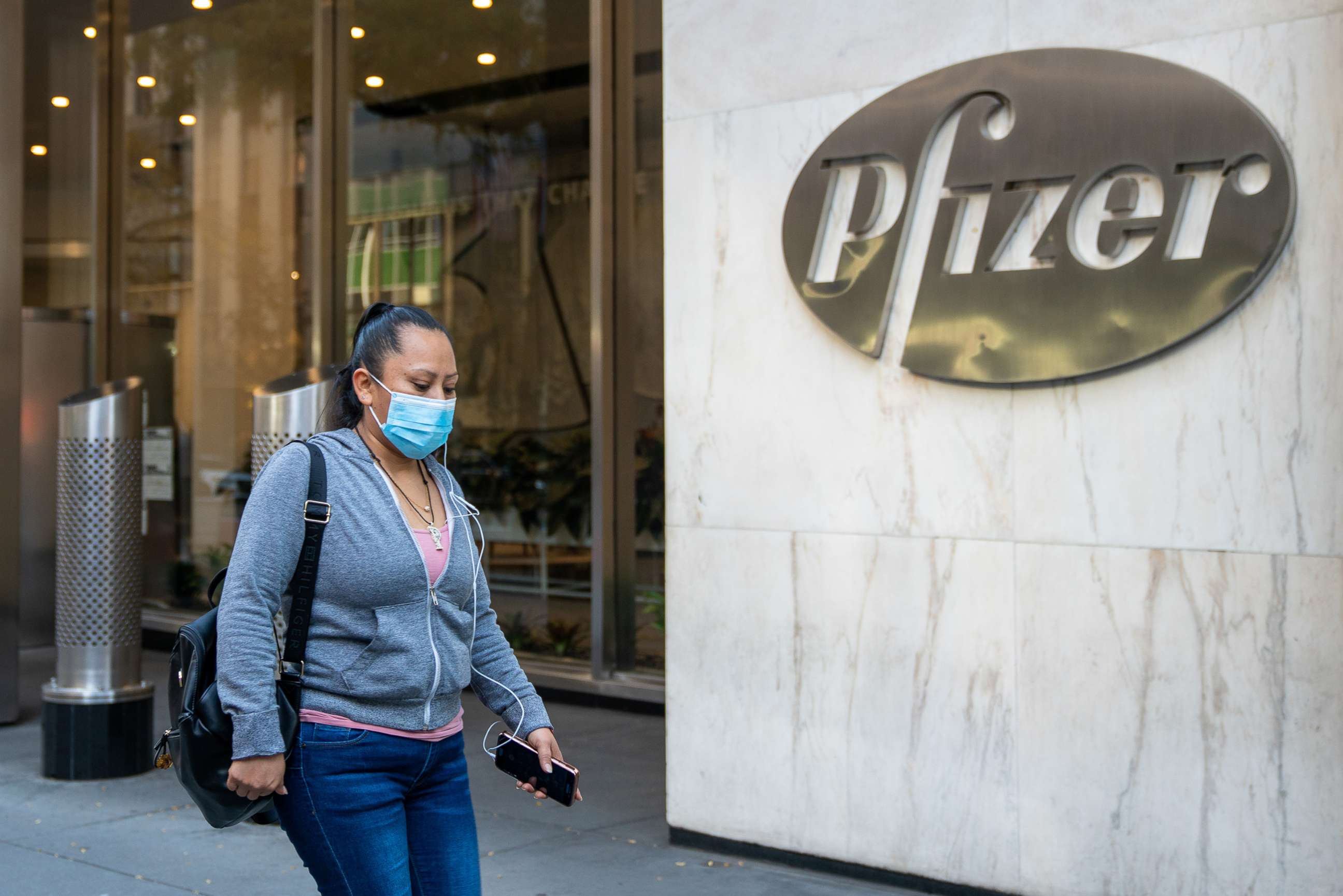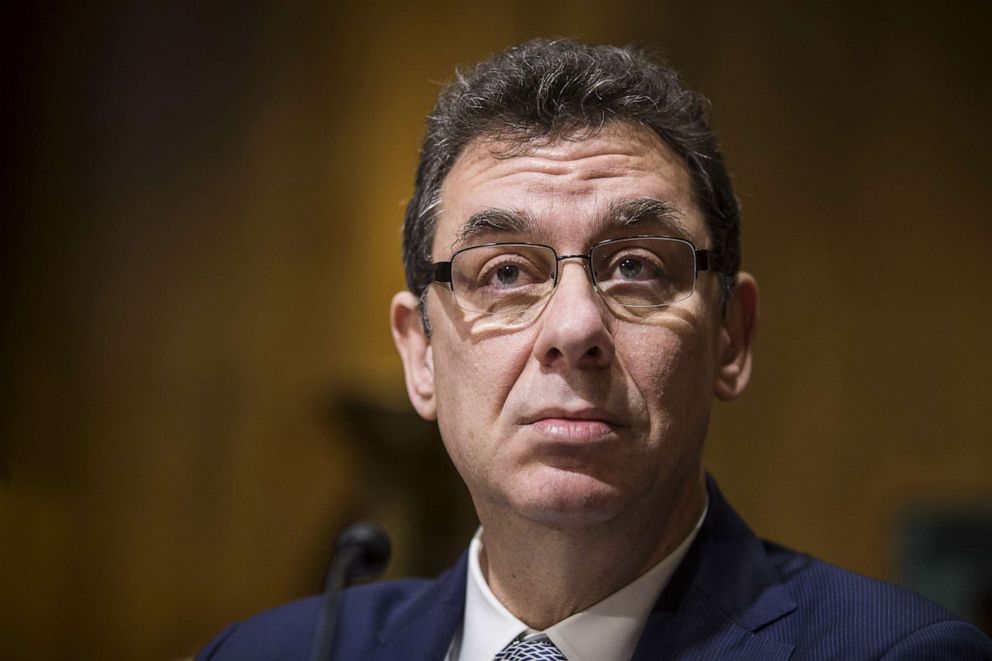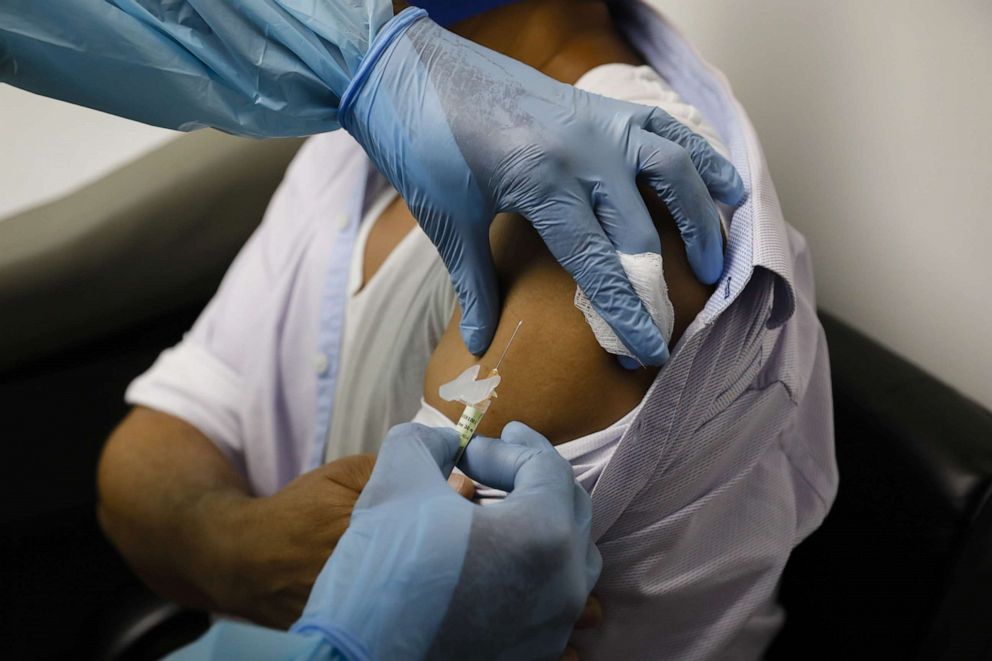Pfizer vaccine news 'as good as you could hope for'
Scientists, doctors are encouraged by 90% efficacy but caution long road ahead.
Pfizer announced on Monday that a COVID-19 vaccine appears to be at least 90% effective in an early analysis, results that doctors and scientists interviewed by ABC News celebrated as "encouraging" as the nation faces a pandemic that's already claimed more than 237,675 lives.
More safety data is needed before the pharmaceutical company will ask the Food and Drug Administration for authorization, but 90% efficacy is "about as good as you could hope for at this point," said David Benkeser, assistant professor of biostatistics and bioinformatics at Emory University Rollins School of Public Health. "Obviously, the full data aren't available yet to answer all the questions we're interested in, but a 90% efficacy estimate after that many events is a very good sign."
The nation's top infectious disease doctor, Anthony Fauci, called the 90% efficacy report "extraordinary" when talking to reporters on Monday. The FDA previously said it would accept a COVID-19 vaccine that is at least 50% effective.
Despite the promising news, vaccine experts and biostatisticians are not ready to declare victory just yet. Pfizer's estimate that its vaccine is roughly 90% effective is based on an early analysis of the first 94 volunteers to become infected with COVID-19 in the company's ongoing late-stage clinical trial, in which 44,000 volunteers will be given either a placebo or the vaccine.
To prove the vaccine is effective, the vast majority of COVID-19 illnesses need to happen in the group of people who receive the placebo shot, and the imbalance must be hefty enough for biostatisticians to feel confident the vaccine is working, rather than chalking it up to random chance.

Vaccine specialists caution that as the trial continues, the 90% efficacy figure could increase or decrease, and that the vaccine may ultimately prove to work better in some groups than in others.
"That is certainly possible, especially in the elderly and immune-compromised. I am worried that the data they have are just from young participants," said Dr. Paul Goepfert, M.D., a professor of medicine and microbiology at the University of Alabama and director of the Alabama Vaccine Research Clinic.
And although the vaccine hasn't sounded any safety alarms, the FDA will require at least two months of safety data before it considers even a limited authorization for special groups. It also requires at least six months of data for full approval and widespread dissemination.
Pfizer is the first of several companies to report results from ongoing late-stage trials. Moderna, another company in the race for a vaccine, launched a trial on July 27 -- the same day as Pfizer. Two other peers, AstraZeneca (Oxford) and Johnson & Johnson, launched U.S.-based late-stage trials in August and September, respectively.
Pfizer was able to hit this major milestone within a few short months in part because of the severity of the pandemic. With cases surging in the United States, many trial volunteers were inadvertently exposed to the virus, helping the company quickly ascertain whether the vaccine is likely protective.
It's "the sad upside of a virus that is raging out of control," said Dr. Paul Offit, a professor of pediatrics at Children's Hospital of Philadelphia and a member of an independent vaccine committee that advises the FDA.
"The uncontrolled pandemic in the U.S. helped 'a lot' to rapidly reach endpoints," agreed Dr. Carlos Del Rio, a professor of medicine and global health at Emory University.

Another factor that may have helped accelerate the pace of Pfizer's trial is its independence from the U.S. government's Operation Warp Speed, a multibillion-dollar effort to accelerate vaccine research, development and distribution. Unlike other companies, Pfizer didn't accept government funding for COVID-19 research, but it struck an agreement linked to Operation Warp Speed to receive $1.95 billion of taxpayer dollars for 100 million doses of the vaccine, should the FDA authorize it.
Pfizer CEO Albert Bourla told ABC News Chief Medical Correspondent Dr. Jennifer Ashton that independence from Operation Warp Speed allows his company to remain agile.
"I wanted to liberate our scientists from any bureaucracy that could come by accepting money," said Bourla, who noted Pfizer collaborates with the government while remaining independent. "And in retrospect, I think this was a very good development. We have wonderful collaboration with the Operation Warp Speed people and BARDA and the US Army and the head of this operation."
Moderna, AstraZeneca and Johnson & Johnson accepted Warp Speed funding. Moderna has enrolled all 30,000 volunteers for a late-stage trial and expects to publish its first interim analysis later this month.
Despite the promising news, vaccine specialists voiced concerns that granting limited FDA authorization based on early data could jeopardize the future of COVID-19 vaccine research because volunteers might be less inclined to participate in ongoing clinical research. Pfizer has committed to continuing its late-stage trial for two years regardless of whether the FDA agrees to a limited authorization.

And in recent weeks, the FDA signaled hesitation about whether granting a limited authorization based on an interim analysis and only two months of safety data would be the right thing to do. These thorny questions about how much data is enough -- particularly during a still-raging pandemic -- were raised at a meeting late last month of the Vaccines and Related Biological Products Advisory Committee, an independent committee that offers weighty but non-binding recommendations to the FDA.
"We are concerned about the risk that use of a vaccine under an EUA would interfere with long-term assessment of safety and efficacy in ongoing trials and potentially even jeopardize product approval," said Marion Gruber, director of the FDA's office of vaccines research and review, speaking at the virtual meeting.
Pfizer has said it could seek FDA authorization in the third week of November, and Moderna said it could have data by the end of this month, with an FDA authorization following in December. Even if these vaccines are authorized within the next few weeks and months, there will be limited supplies at first, with any successful vaccine likely prioritized for high-risk patients under a limited approval.
As the pandemic surges in many parts of the country, the Centers for Disease Control and Prevention continues to ask Americans to wear masks, socially distance and take other measures to stop the spread of the virus.
Still, if Pfizer's vaccine and others continue to demonstrate strong efficacy, they soon could become another crucial tool in stopping the pandemic.
"It's exciting news," said Dr. Richard Besser, president and CEO of the Robert Wood Johnson Foundation and an ABC News contributor. "If it truly is 90% effective, [it] could have a dramatic effect on this pandemic in the long run. It's not gonna help us this winter, but it could be a real game-changer."
This report was featured in the Tuesday, Nov. 10, 2020, episode of “Start Here,” ABC News’ daily news podcast.
"Start Here" offers a straightforward look at the day's top stories in 20 minutes. Listen for free every weekday on Apple Podcasts, Google Podcasts, Spotify, the ABC News app or wherever you get your podcasts.




